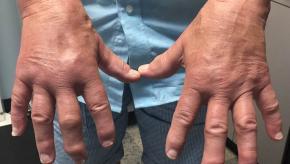All News
Immunomodulators in the Treatment of Autoimmune Hepatitis
Autoimmune hepatitis (AIH) is a chronic, progressive inflammatory liver disease driven by autoimmune mechanisms, characterized by elevated serum aminotransferases, hypergammaglobulinemia, and interface hepatitis on histology.
Read ArticleICYMI: Channeling Bias and Cancer Risk with Biologic or Targeted Synthetic DMARDs
A retrospective US administrative claims cohort study of RA patients on tumor necrosis factor inhibitors (TNFis), non-TNFi biologics, or Janus kinase inhibitors (JAKis) found a statistically significantly higher risk of incident cancer in patients receiving rituximab, abatacept, or JAKis (compared with TNFis).
Read ArticleICYMI: AGA Guideline: Prevention and Treatment of Hepatitis B Virus Reactivation in At-Risk Individuals
The American Gastroenterology Association has published its revised clinical practice guidelines for the prevention and treatment of hepatitis B virus (HBV) reactivation in at-risk patients, particularly those with immune-mediated disease, receiving immunomodulatory therapy and steroids.
Read ArticleICYMI: Combination treatments in Psoriatic Arthritis
Despite the advances in the treatment of PsA with biologic (bDMARD) and targeted synthetic (tsDMARD), less than half of patients with this condition achieved remission or low disease activity. Combination DMARD treatment is often used in order to achieve remission or minimal disease activity. The standard practice is to use a conventional synthetic (csDMARD) with a bDMARD. The use of the combination of bDMARD with a tsDMARD such as a JAKi or TYK2i is a new order in the treatment of PsA.
Read ArticleICYMI: Axial Involvement in Psoriatic Arthritis
Analysis of a Greek Psoriatic Arthritis (PsA) cohort shows that nearly one quarter of patients have axial involvement, and among them, ∼30% have isolated spinal axPsA and nr-axSpA, respectively.
Read ArticlePCR: Prevalence, Cost, & Risk (6.27.2025)
Dr. Jack Cush reviews the news and journal reports from last week on RheumNow.com
Read ArticleTrends and Innovations from Barcelona (6.20.2025)
Dr. Jack Cush reviews highlights, trends and novel studies from EULAR 2025 in Barcelona from last week.
Read ArticleWhat would it take for JAKs to ROCK the boat?
JAK inhibitors have taken a beating over the last three years. The excitement and potential has been tempered by mounting cardiovascular safety concerns, but specifically in at-risk patients, compared to TNF inhibitors. So it is an intriguing idea to pair JAK inhibitors with something that might have a cardioprotective effect. It is therefore worth excitement that we have a therapeutic option to follow which does just that. At EULAR 2025, we have seen phase 2 results for CPL’116, and a simultaneous publication in The Lancet Rheumatology.
Read ArticleEULAR 2025 – Day 4 Report
Saturday was the final day of EULAR, and included several lectures, but mostly late breaking abstracts and new EULAR guidelines - notably on Rheumatoid Arthritis and another on Interstitial Lung disease in connective tissue disorders. My favorite presentations included the following.
Read ArticleFrom Domains to Decisions: Personalizing PsA Care with Data
At EULAR 2025, Dr. Laura Coates (Oxford) took the plenary stage to reframe how we think about treating psoriatic arthritis. The message was clear: in 2025, PsA treatment is no longer about following a linear algorithm; it’s about understanding the unique constellation of domains, comorbidities, and patient factors that shape each clinical decision.
Read Article




Links:

Links:




Jiha Lee JihaRheum ( View Tweet)











